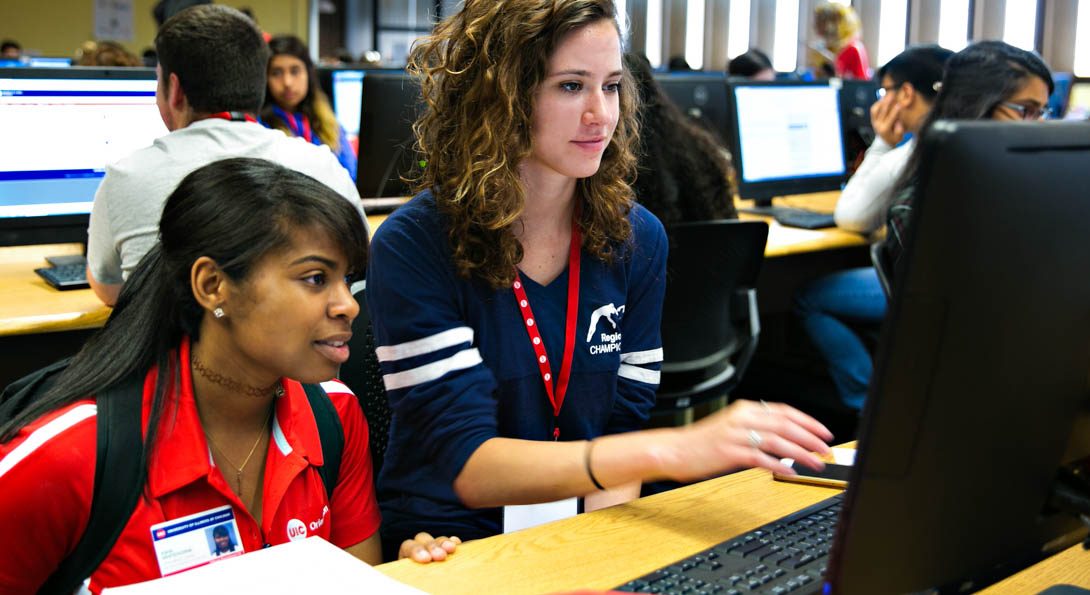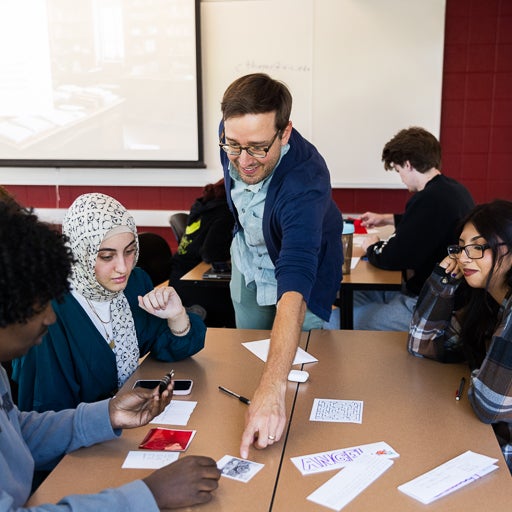LAS Teaching Excellence Resources

Develop Your Teaching Practice and Promote Student Success!
Top Priorities
-
Build Build your Blackboard Site and Syllabus as Accessible Resources for your Students.
-
Design Design Transparent Course Objectives, Learning Outcomes, and Assessments .
-
Support Foster a Growth Mindset and Support your Students' Success.
Top Priorities
-
Communicate Communicate Expectations and Build Strong Connections with your Students.
-
Reinforce Reinforce the Competencies gained in your course and their relevance to Academic and Career Success.
LAS Syllabus Policies & Expectations
UIC requires that all courses, 0- 500 level, have a syllabus.
The resources below have been created to facilitate compliance.
Syllabus Checklist
Syllabus Checklist
- Instructor and Course Details
- Course rubric, number, title, and credit hours
- Instructor name and contact information
- Student Drop-In (Office) hours and other instructor availability
- Course modality and schedule, including times, dates, and locations
- Course Information
- Course description and prerequisite statement
- Course goals and learning objectives
- For general education courses, include approved Gen Ed Learning Outcomes. Go to this Interactive Dashboard to search for the specific learning outcomes for your General Education course.
- Required and recommended course materials
- Course Policies and Classroom Expectations
- Grading policy and points breakdown, including a list of core assignments and
assessments - Policy for missed or late work, including acceptance of revised work, if applicable
- Attendance/Participation policy
- Information about how to interpret midterm grades.
- Other course policies (as appropriate)
- Grading policy and points breakdown, including a list of core assignments and
- Class Schedule – Weekly calendar of class topics, assignments, due dates, and deadlines. Must align with course level and contact/credit hour policies.
- Accommodations – Statement about disability services and accessing accommodations
- Classroom Environment – Community agreement/Classroom conduct policy
- Academic Integrity – Statement appropriate for the class and aligned with the UIC Student Disciplinary Policy (see Conduct Information for Students).
Additional Suggested Suggestions:
- Academic Grievance Policy and Procedure – Students may be directed to the UIC academic grievance procedure.
- Registration and Records Policies – Students may be directed to the Registrar’s website for a list of registration and records policies.
Templates
For instructor convenience, LAS has developed campus-approved, fillable syllabus templates (Basic and Annotated) that fully comply with the UIC Syllabus Policy.
In addition, the templates include optional sections and information that, while not required by the UIC Syllabus Policy, are highly recommendable, lead to increased transparency, and result in a more inclusive syllabus.
Faculty are not required to utilize these templates. If a syllabus satisfies the checklist above, it will be considered compliant with the UIC Syllabus Policy.
LAS-Specific Competencies and Skills
This LAS EPC-endorsed competencies document outlines transferable skills that we can reasonably assume UIC LAS students will have developed or mastered upon graduation, regardless of major.
Faculty should consider consistently presenting these competencies as part of their courses’ learning objectives and reinforce them throughout the semester.
Departments may consider using this resource when detailing the academic profile of their majors, minors, and certificates.
LAS Writing in the Discipline Major Requirement: Guidelines
Teaching a course designated as Writing in the Discipline for a major?
LAS Guidelines for Writing in the Discipline Courses
LAS Student Drop-In Hours Guide
LAS Student Drop-In Hours
Drop-In Hours (Office Hours) encourage and facilitate student communication with faculty. Research documents how quality interactions with faculty positively affect grades, persistence, and retention.
Tell me Your Story
Start a conversation, promote help-seeking behaviors, provide timely academic support, and encourage a growth mindset.
LAS General Education Resources Website
LAS General Education
Find additional resources relevant when teaching a general education course.
Campus Instructional Design and Technology Support Services
UIC provides numerous services to support course design, the technologies required for on-campus, hybrid, and asynchronous online instruction, and the implementation of open education resources.
Instructional Design Services
Instructional designers use educational research and innovative instructional practices to help instructors enhance student engagement, satisfaction, and learning outcomes.
Course Design & Reviews
If you would like to partner with the instructional design team for a course design or course review project, please contact us, and the senior instructional designer will set up a meeting to discuss your course needs.
Designing & Teaching an Online Course
CATE has designed a course to share best practices, resources, templates, and technologies to create a quality online course. This course has been developed as an online course to help model best practices and research on online learning. The online asynchronous course contains the following modules:
- Module 01 – What makes a good online course?
- Module 02 – How do I begin planning my online course?
- Module 03 – What does good online teaching and facilitation look like?
- Module 04 – How do I build an online course site?
If you are interested in being enrolled in the Designing & Teaching an Online Course, please complete this Google Form to be enrolled. Each module contains guidance and advice that you can use to design your online course by yourself or with the help of an instructional designer.
If you would like to partner with the instructional design and media production studio, please schedule a 25-minute or 50-minute consultation with an instructional designer to discuss your course design needs.
Learning Technology Solutions
LTS’s core mission is to facilitate the meaningful use of new technologies to improve teaching, learning, and research outcomes. Collaborating with colleges, departments, faculty, and staff, LTS will now provide consulting, design, and training for specialized educational technologies. We will also support active learning spaces and offer general assistance with all teaching and learning applications.
For more information on the services the LTS Support Team offers, go here.
Media Production Services
The Studio assists in multimedia production, including general consultations about multimedia use for instruction, graphic design, media conversion, closed captioning, and video production.
Media Production Services:
- Lightboard Studio
- Video Production
- Closed Captioning
- Media Conversion
- Media Software (E.g., Camtasia, Panopto, Adobe Premiere, etc.)
For more information, go here.
Generative Artificial Intellingence
The Generative AI landscape is rapidly changing and becoming ubiquitous in higher education and the professions.
UIC Resources
UIC Technology Solutions manages and makes available these AI Resources for all faculty and students.
CATE also offers the Enhancing Teaching and Learning with Generative AI Tools (Workshop Slides).
Use Guidelines
CATE and the U of I System offer the following resources to help guide faculty and students on best practices and potential risks.
ChatGPT: Perspectives and Strategies for Prohibiting, Reducing, or Embracing it in Your Curriculum
UIC Information Technology: Statement on Responsible and Acceptable Use of AI
Generative AI Guidance for Instructors
Generative AI Guidance for Students
See also the University of Michigan’s Getting Started with Generative Artificial Intelligence: Instructor Guide.
OER
UIC’s Open Educational Resources Program
“Open Educational Resources (OER) are teaching and learning materials that are freely available online for everyone to use, whether you are an instructor, student, or self-learner. Examples of OER include: full courses, course modules, syllabi, lectures, homework assignments, quizzes, lab and classroom activities, pedagogical materials, and many more resources contained in digital media collections from around the world.” – OER Commons
Online Learning Readiness Training for Students
To help students assess their online readiness and increase their readiness before taking an online course, the Studio has developed an Online Learning Readiness Training for Students. This training module is designed for online students who are enrolled in one of the following course modalities: online asynchronous, online synchronous, hybrid, and synchronous distributed.
You can utilize this training module in two ways:
Send an email to your students before the term starts with a link to the Online Learning Readiness Training for Students: Email Template to Send Students a Link to the Training.
Or place the shareable link in your course site: Shareable Link to Online Learning Readiness Training for Students.

CATE Teaching Guides
On-demand resources provide an overview of evidence-based teaching practices and curricular strategies tailored for our UIC community.
Additional Teaching Guides
Resources that offer further teaching guidance, focusing on cognitive and non-cognitive student academic success strategies.
Learning Matrix
The Science of Learning Research Center has developed a Higher Education Learning Framework Matrix Handbook. The focus is on how students learn to learn.
They also provide a very useful Summated Matrix, including teaching, student, and assessment perspectives for each topic.
Topics include:
1. Learning as becoming
2. Contextual learning
3. Emotions and learning
4. Interactive learning
5. Learning to learn and higher order thinking
6. Learning challenge and difficulty
7. Deep and meaningful learning
RIT
Research-informed teaching (RIT) can take different forms:
- research-led -where students are taught research findings in their field of study.
- research-oriented -where students learn research processes and methodologies.
- research-tutored -where students learn through critique and discussion between themselves and faculty.
- research-based learning -where students learn as researchers.
For more information on RIT best practices and considerations, see the following:
SMART
What’s SMART?
A SMART goal functions as a driver toward a larger achievement and has five components. The goal must be specific, measurable, attainable, relevant, and time-based.
Overarching goals such as “I want an A in this class” do not fit this framework. Examples would be “I will visit the Math and Science Tutoring Center once every week;” or “I will visit my professor’s Student Drop-In Hours with questions four times this semester;” or “I will visit the Writing Center with a draft of my work each time I have a writing assignment.” Faculty who work with their students to establish individual or community SMART goals have found a notable improvement in student success in the course.
SMART Goals Template for Students
growth mindset
People who have a growth mindset believe that ability/skills/knowlege can be changed and developed and that performance can be improved with effort, helpful feedback, normalizing of mistakes or failures, and using effective strategies for learning. In contrast, people who have a fixed mindset about ability believe that people either have ability or do not have ability and nothing can be done to change it (Dweck, 2006).
Research demonstrates that when students have a growth mindset about their ability to grow and develop new skills and expertise, they are better able to persist through setbacks and are more likely to embrace challenges as opportunities for growth.
The following resources guide faculty to integrate a growth mindset framework in their coursework in the syllabus, classroom, and Student Drop-In Hours.
Growth Mindset Framing and Feedback Tools
Growth Mindset Culture Practice Categories
A pivotal time to encourage students to adopt a growth mindset is right before and right after the two first substantial assessments in your course.
This resource offers concrete language for “psychologically attuned assessment wrappers” with specific sections for pre-assessment AND post-assessment messaging.
assignment calculator
Many universities make an “Assignment Calculator” available to students, which helps address time management and organizational issues.
Assignment Calculators break down projects into manageable steps based on due dates. Each step includes helpful hints and “how-to” links.
Any interim due dates provided by the professor (for working thesis, bibliography, first draft, etc.) take precedence over dates suggested by the Assignment Calculator.
The link to an Assignment Calculator may be included on your Blackboard page. Students may be encouraged to use this tool as the semester’s work starts to build up.
These are two examples of Assignment Calculators:
Stanford Learning Lab Assignment Calculator
Boise State Assignment Calculator
VALUE Rubrics
American Association of Colleges and Universities: Valid Assessment of Learning in Undergraduate Education (VALUE)
VALUE is an authentic approach to assessment designed to articulate and measure the skills, abilities, and dispositions that students need and that parents, policymakers, and employers demand.
VALUE rubrics are open educational resources (OER) that enable educators to assess students’ original work. AAC&U offers a proven methodology for applying the VALUE rubrics to evaluate student performance reliably and verifiably across sixteen broad, cross-cutting learning outcomes.
STEM DFW
The Big Ten Academic Alliance (BTAA) Cluster examined student STEM course data and the practices and policies affecting success rates in entry-level courses, emphasizing closing achievement gaps for historically underserved student populations.
The following learning memo highlights the cluster’s work to examine how an analysis of DFW rates reveals equity gaps and understand how these grade markers correlate with student retention and graduation outcomes.
Campus Teaching-Related Policies
Dean of Students: Services and Forms

Student Support Resources
Students often need support. UIC has ample mechanisms, services, and centers to support academic success and personal wellbeing. LAS has curated some of the most important categories and sites for you.